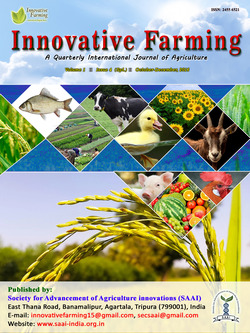
Isolation And Characterization of Sclerotium rolfsii Sacc. Causing Collar Rot of Pigeonpea in Tripura
Durga Prasad Awasthi*
Department of Plant Pathology, College of Agriculture, Tripura-799 210, INDIA
Partha Das
AICRP on Pigeonpea, College of Agriculture, Tripura-799210, INDIA
Biman De
AICRP on Pigeonpea, College of Agriculture, Tripura-799210, INDIA
Sujoy Hazari
AICRP on Pigeonpea, College of Agriculture, Tripura-799210, INDIA
Navendu Nair
Department of Entomology, College of Agriculture, Tripura-799210, INDIA
DOI: NIL
Keywords: Disease incidence, sclerotia, PDA medium
Abstract
In Tripura, Pigeonpea {Cajanus cajan (L.) Millsp.} is grown in an area of 6,500 ha having productivity of 1.8 t/ha. Among major diseases of pigeonpea in Tripura such as Phytophthora Stem Blight (PSB) and Fusarium Wilt; a new disease namely collar rot caused by the fungi Sclerotium rolfsii Sacc. is becoming a crucial threat. The disease starts appearing after one to four weeks of sowing of the crop in a sporadic manner. Leaves of the plants shows water soaked light brown or yellow appearance followed by drooping and drying of leaves. Under favourable climatic condition collar region of the infected plant shows white mycelia growth of the fungus and sometime initials of sclerotia were also observed under in vivo condition. During present study average disease incidence of 8.5% was observed in the year 2015-16 & 2016-17. The fungus was isolated and grown in Potato Dextrose Agar (PDA) medium & Koch’s postulates was confirmed. Cultural and morphological characteristics like dry mycelial weight, mycelial diameter, time of appearance of initials of sclerotia, pattern and numbers of sclerotia produced were also recorded. Small reddish brown sclerotia were found to be distributed throughout the petri plates, average numbers of sclerotia produced was found to be 573.
Downloads
not found
Reference
Anahosur, K.H. 2001. Integrated management of potato Sclerotium wilt caused by Sclerotium rolfsii Sacc. Indian Phytopathology, 54: 158-166.
Aycock, R. 1966. Stem rot and other diseases caused by Sclerotium rolfsii. NC Agric Exp Stn Tech Bull., 174: 202.
Datar, V.V and K.J. Bindu. 1974. Collar rot of Sunflower, A new host record from India. Curr Sci., 43: 496.
Punja, Z.K. and S.F. Jenkins. 1984. Light and scanning electron microscopic observation of calcium oxalate crystals produced during growth of S. rolfsii in culture and in infected tissue. Can. J. Bot., 62: 2028-32.
Saccardo, P.A. 1913. Sclerotium rolfsii. Sylloge Fungorum. Pavia, Italy. 22: 1500.
Singh, U.P. and M.S. Pavgi. 1965. Spotted leaf rot of plants—a new sclerotial disease. Pl Dis Reptr., 49: 58-59.
